Aaaand relax: Ease anxiety, sleep better and worry less from the palm of your hand
Making time for meditation in your day-to-day life can be hard. Like flossing your teeth or doing that post-run stretch, we know it’s something we should be doing, but actually getting it done is a different story. That’s where a handy meditation app comes in.
For most, the first hurdle is how exactly you go about meditating. It’s often a bit more complicated than just shutting your eyes and listening to your breath. While there’s no right or wrong way to meditate, a number of apps have been developed to help you learn how to find your zen.
To help you decide which meditation app will help you find the mindfulness you’re seeking, we’ve tested the most popular out there. All available on both iOS and Android devices.
What are the benefits of meditation?
There’s a lot of research into the benefits of meditation, so if you’re struggling to understand why everyone but you seems to be doing it, here’s the science behind the apps:
Stress reduction:A study published in the JAMA internal medicine journal looked at the effects of meditation on over 3,500 participants. Researchers found that mindful meditation helped those suffering with negative side-effects of stress, such as anxiety and depression. What’s more, an eight-week study published in Brain Behaviour and Immunity found that mindfulness meditation reduced neurogenic inflammation – a symptom of psychological stress.
Reduced anxiety: A number of different studies have found meditation had a positive impact on those suffering with anxiety. One study, published in the Journal of Behavioural Medicine found regular meditation reduced symptoms of anxiety disorders, such as phobias, social anxiety, panic attacks and obsessive-compulsive behaviours.
Improving sleep: Research conducted by the American Academy of Sleep Medicine found that regular meditation was an effective treatment for those suffering with insomnia.
Better brain function: According to researchers at the University of Waterloo, practising brief sessions of mindfulness meditation can significantly improve brain function and energy levels.
Why are meditation apps so popular?

Although your local yoga studio probably teaches a meditation class, the rise in apps have made meditation far more accessible. With the help of an app, it’s easy to fit guided meditation into your commute, your lunch-break, or even your parkrun.
As we mentioned above, there’s no right or wrong when it comes to meditation, but there are two main types. In focused-attention meditation, you will concentrate on a single object or visualisation, ridding your mind of attention and distraction.
During open-monitoring meditation, you are aware of all aspects of you environment; this form of meditation encourages you to become aware of any thoughts or feelings you might be suppressing in your day to day life. In order to work out which best suits you, it’s a good idea to try both.
What are the best apps to download?
Headspace
Best for: An all-round experience of meditation
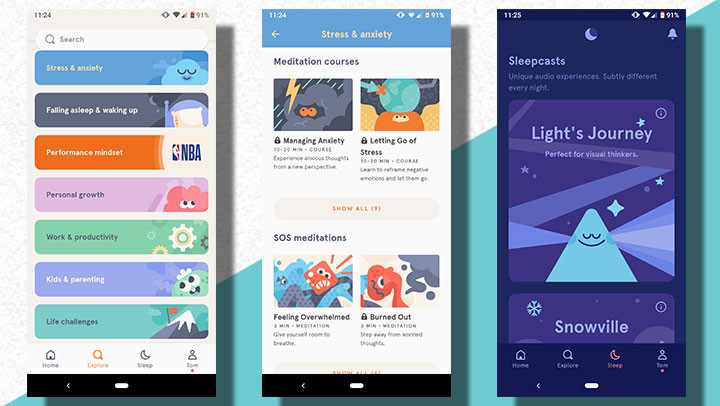
Developed by Andy Puddicombe, who spent ten years at a Tibetan monastery in the Indian himalayas, Headspace was launched in 2010 as an events company, teaching people to meditate. However, Puddicombe and his Headspace partner Rich Pearson soon found attendees wanted to take their meditation home with them, and the Headspace app was born.
The app itself is packed with guided meditations, animations, articles and how-to videos to help you learn to meditate at home. With millions of users all over the world, it’s one of the most popular meditation apps on the market and it’s easy to see why.
Subscribers have the option to follow a longer, structured course, which offers daily meditations on topics such as anxiety, letting go of stress and managing relationships. There’s courses for students, pregnant women, those who are dealing with cancer and even a section for athletes. There’s also shorter SOS meditations, in case of sudden meltdowns, and a daily meditation uploaded each morning.
A big development in the app came a couple of years ago, when Headspace partnered with Nike to bring you guided meditation runs. The sleep by Headspace section of the app also deserves a mention, allowing users to set a bedtime reminder every evening, then follow a number of sleep sounds or wind down sessions to help them drift off.
The pros: There’s a lot to offer on the free version of the app – ten basic sessions, the first session of all of Headspace’s courses, a kids calm course, obstacle animations, three sessions of everyday Headspace, three sleepcasts and five sessions of sleep music.
The cons: Like most of the apps on this list, in order to unlock more of the app’s best features, such as the full courses and sleepcasts, you’ll need to subscribe.
How much: Headspace is free to download and there is a free version of the app. They offer a number of different subscription options, the cheapest being an annual payment of £74.99, or a monthly payment of £9.99 a month on iOS. On Android prices start from £5.99.
Calm
Best for: Those who struggle to get to sleep at night
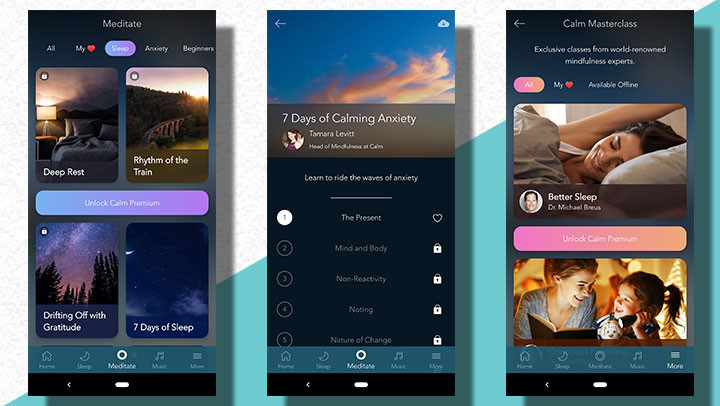
In our eyes, one of the main draws of Calm is the sleep stories – think adult bedtime stories that’ll help you fall into a deep sleep, read by voices you’ll recognise. There’s new stories added each week, so you won’t get bored. If you’ve ever nodded off listening to Stephen Fry reading Harry Potter, this is the app for you.
There’s more than 100 traditional guided meditations, aimed at helping you manage anxiety, lower stress, work on your relationship and sleep better at night. You can divide sessions by beginner, intermediate and advanced meditations, teaching you the skills you need to find meditation simple.
Other stand-out features include the music section of the app, which has special tracks to help you focus, relax and go to sleep, and the body section, which includes videos on stretching and mindful movements.
The pros: The adult bedtime stories really are a particularly soothing end to the day. We also found the sleep music came in handy when travelling.
The cons: There isn’t a free version of the app, so if you want to try Calm, you’ll need to sign up for a seven day trial. After this, you’ll need to commit to subscribing if you want to carry on using the service, however, it is one of the cheaper meditation apps on this list.
How much: It’s free to download, but after your week’s free trial is up, a yearly Calm membership costs £35.99 for a year. There’s also a monthly membership for £13.49 a month (iOS pricing).
Stop, Breathe and Think
Best for: Those who want a personalised experience
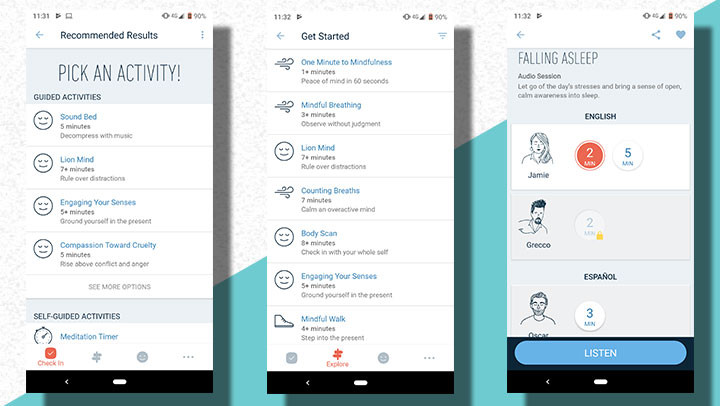
Unlike other meditation apps, Stop, Breathe and Think makes you ‘check-in’ before you meditate, in order to find the best sessions for you. Kind of like a personal trainer asking you to fill out a form before you get to the gym floor, this app asks you have a quick scan and really think about why you’re meditating before you begin.
Once you’ve worked out where you’re at, the app will suggest a number of different activities, varying in length and activity – some will be guided breathing, others will be more of a traditional meditation session. Using this app, we felt like we had our own mindfulness coach, with the progress part of the app tracking each ‘check in’ before and after meditation, giving you a better idea of how stressed or anxious you’ve been feeling over the month.
As the app’s name suggests, the goal is to make you stop what you’re doing, practise some mindfulness, and think about your goals using meditation. The goals include taming anxiety, managing depression, breathing mindfully and sleeping better. You get 40 activities on the free version of the app, whereas those who have upgraded to a premium membership will unlock over 100 activities, including yoga and acupressure videos.
The pros: The personalised part of app is great. Stop, Breathe and Think also share’s 10% of its net revenue with Tools for Peace – a non-profit organization that teaches at-risk children the benefits of meditation.
The cons: Not much of a con, but you really need to commit to logging in to this regularly in order to see the benefits.
How much: The app is free to download and subscriptions cost £9.99 a month, or £54.99 yearly (iOS pricing).
10% Happier
Best for: Those who have tried and failed to meditate more than once
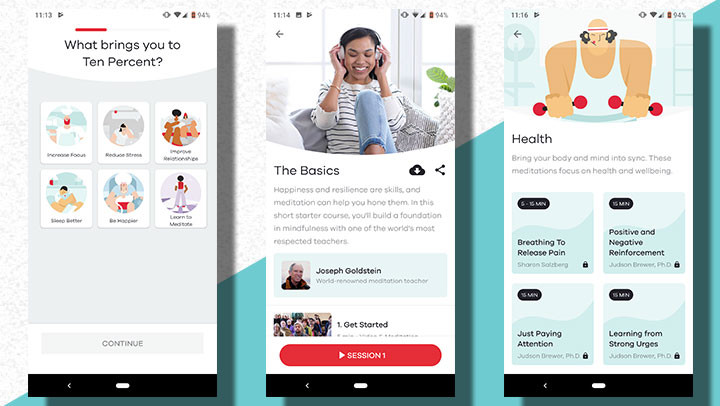
10% Happier sells itself as an app for meditation sceptics. The co-founder of the app is ABC news anchor Dan Harris, who turned to meditation after suffering an on-air panic attack in 2004. In the years following, Harris has written a book and presented a podcast on meditation.
The app shares Harris’ simple ‘no frills’ approach to meditation and is designed for skeptics, but built to help you keep it going. In other words, if you want to feel the benefits of meditation without it taking over your life, this is the app for you.
When you log into the app, it will ask you if you’ve tried meditation before, when you feel like you’d like to meditate and what you’d like to get from it. The app itself offers a number of different courses, including one on meditation for skeptics, with each session giving you a video to watch and a meditation.
There’s also relevant content on topics such as political stress and for activities like walking along in the city. Like other meditation apps, there’s single meditations for you to log into when you need it and a number of different sleep sessions, which range from five minutes, to 45 minutes long.
The pros: There’s new content uploaded weekly onto the app, stopping meditation from becoming boring.
The cons: Like Calm, after your seven day free-trial, you have to pay to use the app.
How much: The app is free to download, but after the seven day free trial, a subscription will cost £12.99 a month, or £87.99 a year (iOS pricing).
Insight Timer
Best for: Those looking to practise meditation without paying
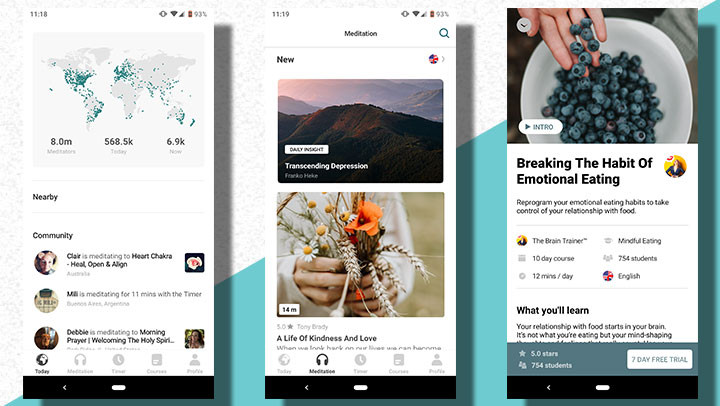
Compared to other apps on this list, Insight Timer has a huge amount of content for free, with 15,000 guided meditations available. The app includes guided meditations and talks led by meditation and mindfulness experts, neuroscientists and psychologists.
Unlike other apps, you can’t customise the length of each session, instead you’ll need to use the ‘guided’ part of the library to find a session that fits into your schedule. If you particularly enjoyed a session, you can follow the instructor and find more meditations to try. If you’re used to meditating, you can also use the timer mode to set yourself a meditation timer for an unguided session.
Topics covered on the app include sleep, dealing with anxiety and reducing stress, getting through recovery and addictions and leadership. We also really like the music tracks and ambient sounds, which come in really handy when travelling or trying to concentrate.
The pros: It goes without saying, the huge amount of free content is amazing.
The cons: Insight Timer can be a bit overwhelming for beginners, as at times it’s a little tricky to navigate around the app. That said, those more into meditation will enjoy the community groups and daily gratitude discussions.
How much: The app is free to download. If you do want to subscribe, premium features include a daily insight, night mode, the entire catalogue of courses, offline listening and 30-day courses. This costs £55.99 per year (iOS pricing).
Simple Habit
Best for: Those too busy to meditate for more than five minutes
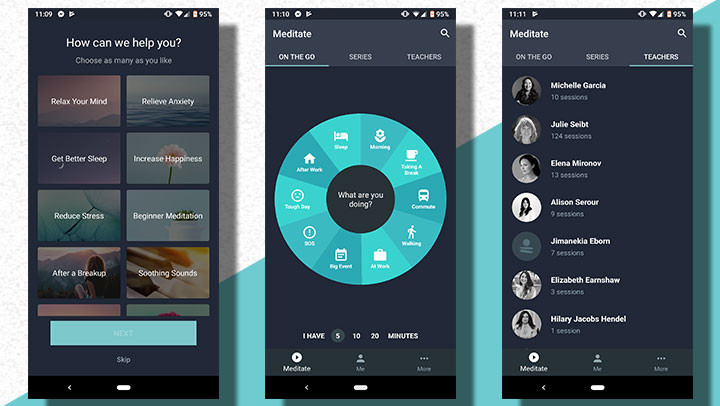
An app of five-minute meditations to calm your mind, no matter how busy you might be. Similar to other apps on this list, when you download the app you’re asked to answer a series of questions about how well you sleep, how stressed you feel and why you’re feeling stressed. You are also asked to set a goal and select the topics you think might help, which generates a personal meditation plan. You can track your progress on the app using the mindful minutes section.
We found the one minute meditations are handy if you’re prepping for a big meeting, or feeling overwhelmed and overall, it’s a nice app to use. It’s easy to find what you’re looking for in a rush, and being able to divide meditations by topic helps you work out exactly what you’re looking for before you start meditating.
As you get used to daily meditation, you might also want to tap into some of the longer meditations on the app, which focus on topics like reducing stress, improving focus and relaxing faster.
The pros: The five minute meditations make it really easy to fit meditation into your daily routine.
The cons: After your free trial, you’ll need to subscribe and this is one of the more expensive apps on this list.
How much: It’s free to download the app, however, after your one week free trial, you’ll need to pay £88.99 a year to continue using the app.
Buddhify
Best for: On-the-go meditation
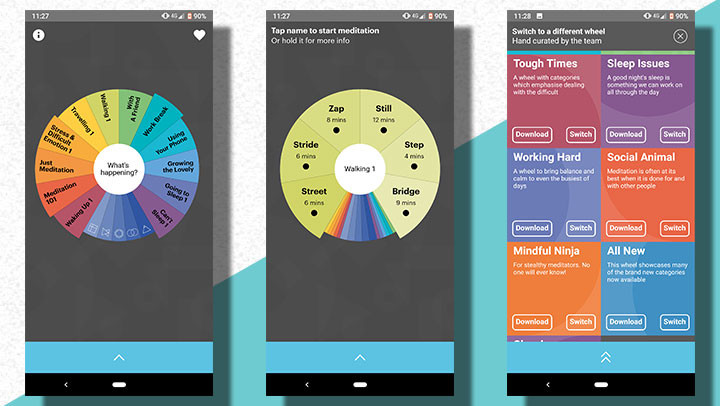
If you’re looking to try an app before you buy, you won’t be able to with Buddhify, but don’t let that put you off. Once you’ve spent £4.99 (or £2.99 if you’re on Android), you’ll have unlocked Buddhify’s colourful library of on-the-go content, presented in a wheel.
The emphasis here is mindfulness on-the-go, with the wheel offering meditations that are designed to fit in with your day – from waking up, to travelling to work or not being able to sleep at night. You can remove meditations from your wheel if they don’t work for you, or tap on a meditation and hold it for more information.
For those who are more experienced, the option to build your own meditation sessions is definitely different to the experience offered on other apps. For complete beginners, the focus on selecting meditations important to you can help set goals, and experience the benefits of meditation quickly.
We really liked the usability of this app and found it really simple to customise the wheel to make using the app even more simple. The meditation for kids section is also bright and engaging.
The pros: Buddhify really does make it easy to fit meditation into your day-to-day life. We found the ‘travelling to work’ and ‘can’t sleep’ meditations particularly soothing.
The cons: Users don’t have the option to try the app out first.
How much: You’ll need to pay £4.99 to download the app on the Apple App store, or £2.99 on Android. For those who want to unlock features such as transmission, which lets you share popular meditations in your own voice, meditation training courses and designing your own meditations, you can subscribe for £24 a year.





